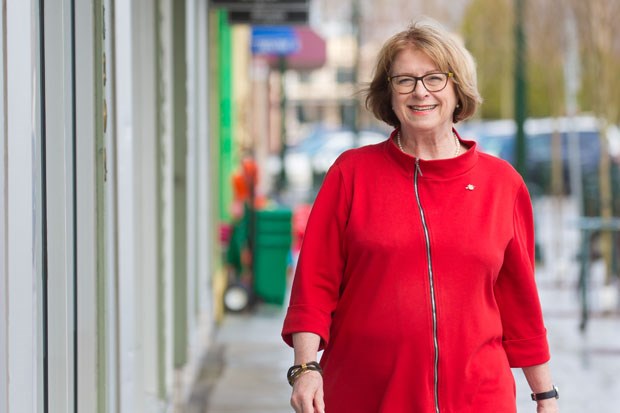As Vicki Huntington wraps up a remarkable era in B.C. politics, the outgoing MLA is hopeful her successor will continue to represent Delta South differently than other ridings and not be afraid to ask the tough questions.
With the writ scheduled to drop next week and a provincial election campaign set to get underway, Huntington reflected on her time in provincial office in an interview with the Optimist at her Ladner constituency office.
"It's been an absolutely amazing experience representing this community," she said. "I truly do think Delta is one of the most wonderful places in the Lower Mainland. I think it is one of the most important land bases in the province and in North America. I will continue to fight to preserve that land base because I think we have a moral duty."
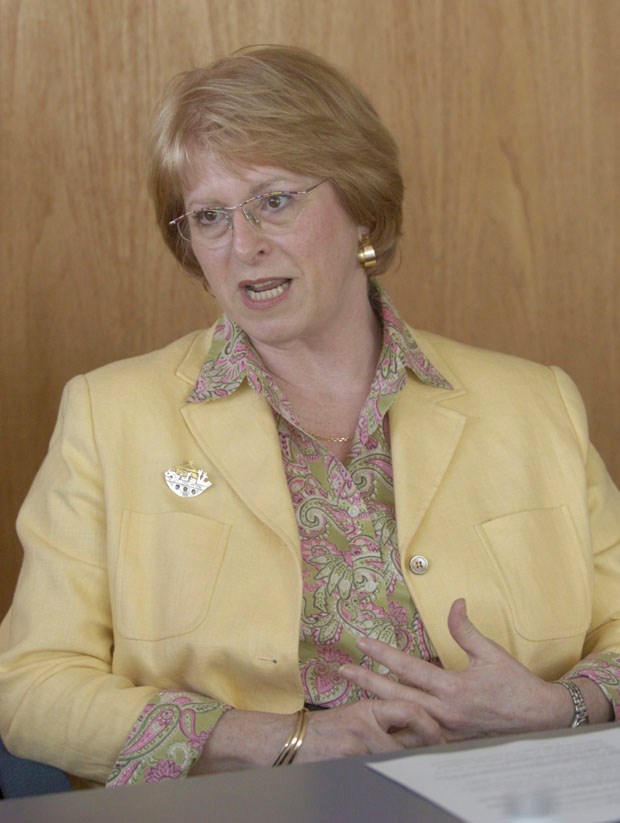
Her impact on the provincial political scene started in 2005 while still an outspoken member of Delta council when, at the urging of a group of residents, she announced she'd take on Liberal MLA Val Roddick. A narrow loss didn't deter her or her supporters as a groundswell of ordinary South Deltans sought a change in how they were represented in Victoria. In the 2009 election, Huntington faced Liberal heavyweight Wally Oppal, the province's attorney general who had accepted the party's nomination after Roddick retired. Her 32-vote victory after a recount turned B.C. politics on its ear.
Huntington was the first independent to win a seat in the legislature in many decades and the first ever to be re-elected in 2013 when she defeated Liberal challenger Bruce McDonald, a former council colleague.
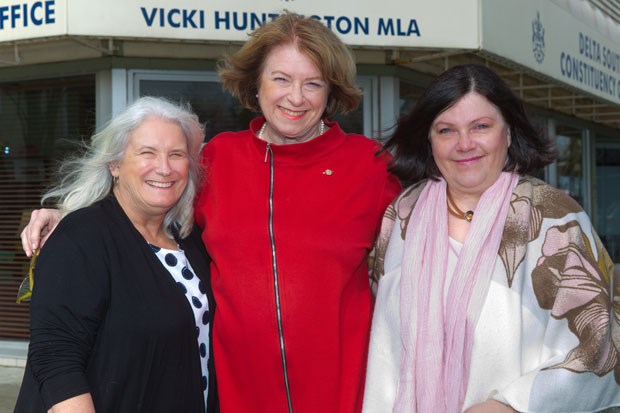
Huntington's electoral success can be chalked up to her appeal to voters from all stops on the political spectrum. Although her power base is primarily made up of disaffected Liberals, many NDP supporters have strategically voted for her, while the Greens didn't field a candidate in Delta South last time out of respect.
Although she comes from a right-wing background, Huntington isn't afraid to speak out and support any issue she cares about, regardless of conventional political leanings. That appeal to both the right and left, as well as the environmentalist camp, combined with her candor, has made her a formidable force.
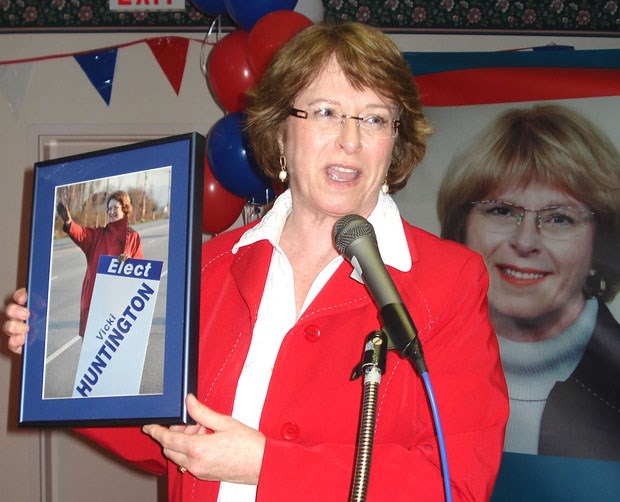
In the legislature, Huntington managed to make herself heard and raised a number of issues, which garnered respect from fellow MLAs on both sides of the floor.
NDP MLA Leonard Krog took it upon himself to pay tribute to Huntington during her last day in the legislature, saying she demonstrated an incredible example of civility and integrity while also being an incredible defender of values.
Looking back, Huntington said she's proud her constituents took a chance on an independent.
"The people in this community are caring, they support each other, they love their quality of life, they deliberately chose to live in Delta and we have to make sure all the newcomers flooding into this community now are somehow made aware that they have to try to keep this place as special as it is."
Huntington, who made the surprise announcement earlier this year that she wouldn't be seeking a third term so she can concentrate on her health, said the people of South Delta need a different style of representation now more than ever because the riding faces so many challenges, which could forever negatively impact the community.
"The issues have transformed. The big issues now are the bridge versus the tunnel, Terminal 2 to a large extent for us who are worried about the environment, the impact of development of not only Terminal 2 but the (TFN) mall on the remaining agricultural lands, whether our ecosystem will survive and continue to support the flyway," she explained. "There are different kinds of issues now. The dredging is a big issue and water lot (leases) which is starting to iron out but it's a signifi cant problem. Diking is going to be a big issue in the future and the province doesn't really have its act together on that one. It's so massively expensive that they don't have their hands around it yet and that's starting to impact redevelopment near the dike."
Huntington said she wishes people here would pay more attention to the proposed Terminal 2 at Roberts Bank because it's much more signifi cant than most realize.
"If Terminal 2 does go ahead, then the pressures on the agricultural land, especially west of Highway 17, are going to be so signifi cant that we're going to lose that farmland. And this is where I am very concerned about the provincial position and, therefore, any Liberal candidate's position. The province supports Terminal 2. The province, directly from the premier, supports industrialization of land to support the port and I've asked her (Christy Clark) that question directly and I was accused of not being in favour of jobs.
"So, we are looking at wholesale development of the lands west of 17A if Terminal 2 goes ahead. The farmers are waiting for it. A lot of them don't want it but a lot do because they figure it's inevitable. It's that inevitability, like Delta calling itself a city, of development which is deeply concerning and if we don't coalesce as a community and fight this, we will lose that land."
Back in 2007, almost 300 residents attended a Save Our Delta forum at the Ladner Community Centre, an event organized by APE (Against Port Expansion), which warned about the community's demise as a result of the expansion of Deltaport and loss of valuable farmland to container storage. The message at that event was that it was time for ordinary residents to take action to stop industrialization plans.
While meetings by concerned residents continue to take place, there no longer seems to be a larger-scale concern, said Huntington, worried Delta as well as the Fraser estuary as we know it will be negatively transformed without an outcry.
She noted that in addition to APE, which continues to lobby, the Boundary Bay Conservation Committee, which isn't heard from nowadays, did a lot of great work promoting the relationship between the environment and the agricultural community. The committee, a group of scientists and concerned naturalists, created a tremendous core that eventually spawned the creation of the Delta Farmland and Wildlife Trust.
The trust is doing a lot of important work, however, it's so afraid of appearing political that it's now low-key, Huntington observed.
"There's nothing other than APE, which is trying to protect the land. The development pressures have been very real and all you have to do is look at the Tsawwassen First Nation and its desire to commercialize its land. Delta council has industrialized Boundary Bay Airport, which was never meant to be a large industrial zone, there are options for multimillions of dollars on land near the port and those options are still there. Then look at the Musqueam land (in Delta) that they want to develop in a critical area agriculturally and environmentally.
"We're losing the fight here and with the province supporting the port, there's not going to be voice that fi ghts this relationship development. You just build on what's there and you have people moving into this community that aren't aware that 15 years ago it was all agricultural land down to Roberts Bank. Now it's all up for sale and there's options all over it and the port is salivating over agricultural land. That's why my office has spent so much time participating in the environmental review panel for Terminal 2.
"It seems to me the community is no longer fighting to maintain what Delta is and what it should remain. There's no new people stepping into the fight. That's the big problem."
Huntington said highways chop up the municipality, making it easier to change its environmental and agricultural identity.
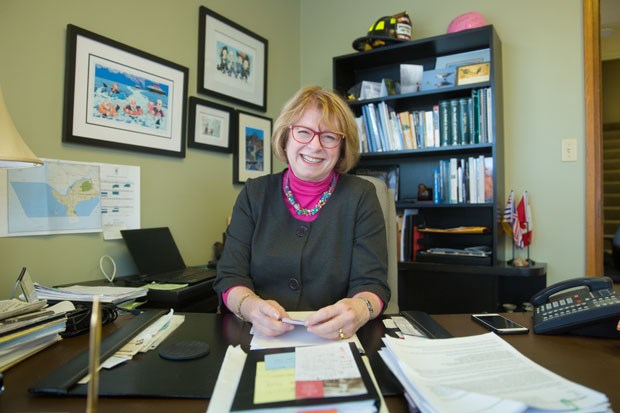
On another front, it was clear even by the end of her time on Delta council that there was no love lost between the five-term council member and Mayor Lois Jackson, who supported Wally Oppal's election bid. That frosty relationship with the mayor, several on council and the administration continues today. Huntington said it's regrettable that civic officials chose not to try to work with her.
Huntington also said she's concerned how the majority of council members appear supportive of the provincial government.
"It concerns me because, to tell you the truth, I see a very real difference in how they're fighting to protect this community and I think they're conflicted. They will be extremely annoyed to hear me say that, but I'm not the only person in this community who feels that way. You are a municipal government, a local government, and you should be fighting for what's best for the municipality," she said.
"Obviously, council thinks it's fighting for what's best. It's just, I think, not what the people are totally supportive of and they've lost sight of the need to protect the land base and the environmental base of this community. That has disappeared... even with little things. We aren't protecting the little things that matter so much in this community.
"They may fault me for speaking on municipal issues, but those are far greater than municipal issues. Those are national and provincially important issues. Protecting the land base and the Fraser estuary is, I think, the most important thing facing this community."
As far as the much talked about George Massey Tunnel Replacement Project, Huntington said there's no doubt another crossing is needed, but the process as well as the answers given by government created a lot of doubt in people's minds.
"All these issues will still be there but, depending on who's elected, they could be represented very differently."
